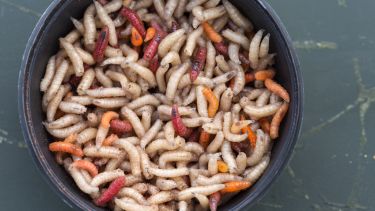How maggots could help millions
Dr James McGregor is looking at how maggots could help solve our food waste problems.

Every year roughly one third of the food produced in the world for human consumption gets lost or wasted - approximately 1.3 billion tonnes. Food losses and waste amounts to roughly £522 billion in industrialised countries and £238 billion in developing countries, in the UK alone we binned £13 billion worth of food in 2016.
Dr McGregor is working with Entomics Biosystems Ltd. on how we can manage eliminating our organic waste more effectively and they are doing this using the larvae of the black soldier fly:
“The larvae, or maggots, feed on decaying organic matter, so they will eat the organic or food waste and as they grow into the next stage of their life cycle they move away from the decaying waste and find somewhere to turn into flies.”
“At that lifecycle stage you can harvest the black solider fly larvae. So you’ve reduced your food waste by over half (as they’ve eaten it) and that solid can be used directly as a fertilizer.”
He explains that is all happening at Entomics’ facility in Cambridgeshire and that researchers have trays filled with organic waste which the larvae are currently feeding on:
We’re looking at what products can be derived directly from the larvae. The terminology used for this is insect biocatalysis.
Dr James McGregor
Senior Lecturer
“The larvae are eating the waste and then turning that in their body into organic oils and they’re largely composed of fatty oily compounds, so lauric acid etc. We’re looking at this and extracting those oils to use as chemical feedstock, in order to create more valuable chemicals. Essentially there’s three products that we can get from the larvae; fertilizer, bio oil and proteinaceous animal feed.”
Dr McGregor highlights that another product that can be derived from the maggots is chitin, and explains how this can be converted into chitosan which is an organic polymer.
“Chitin comes from the exoskeleton of this stage of the larvae, so after it’s eaten the waste and turned into flies and the derivative Chitosan can be used to make bio plastics. It can also be used to make solid catalysts to accelerate catalytic reactions. One of the reactions you can catalyse with chitin based catalysts is biodiesel from the organic oils.”
“Biodiesel isn’t particularly valuable it’s what other valuable chemicals we can potentially make from this – ultimately making waste management more economically viable by actually having a product that you can sell.”
What Dr McGregor hopes to achieve in the future with his research is making urban environments more resilient. He believes societies could have the potential to process their own food waste and generate their own fuel, which could have potential for millions of people across the world.
“It’s something that could be exported into developing countries, so you can have organic waste centres in town and city centres which are able to generate a more valuable product.”
“We’re looking at taking the oil and turning into valuable products including green solvents – a growing market and we’re a taking the exoskeleton and using that as a catalyst not just for this process but a whole host of processes. Hopefully in the future we can use these to replace more expensive catalysts that rely on things such as precious metals, which are hugely environmentally damaging (to mine the metal for example).
“So in a nutshell we’re using a by-product from the waste management procedure as a catalyst.”
